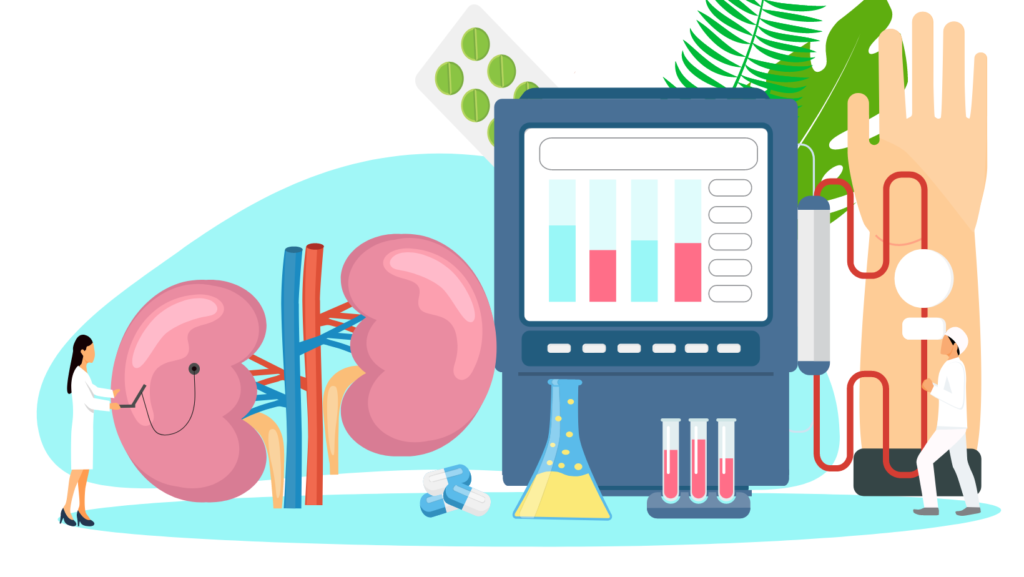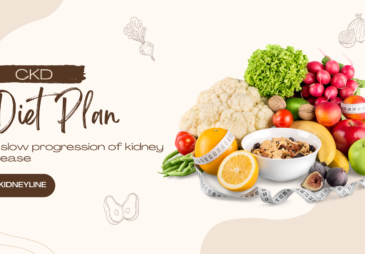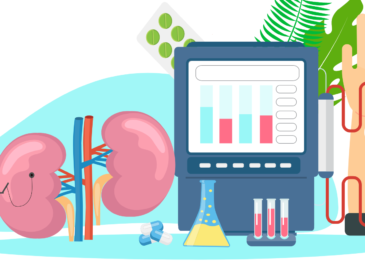If you’ve had personal, family, work, or other experiences with diabetes, you’ve probably heard about the potential for kidney issues. You may even know someone who’s been on dialysis.
Considering this information, upon learning someone new is receiving dialysis, would your first thought include diabetes?
That wouldn’t be a poor assumption because there’s definitely a connection between diabetes and kidney failure.
In fact, diabetes is one of the main causes of CKD.
But before examining the diabetes-CKD relationship, let’s look briefly at diabetes and CKD as individual conditions.
What is diabetes?
Simply put, diabetes is high blood sugar.
So, what does that mean?
Within the body, the pancreas produces a hormone called insulin. Insulin carries glucose (sugar) to the cells and ensures that the bloodstream doesn’t contain too much sugar. When insulin is unavailable or isn’t working, the bloodstream will contain abnormal amounts of sugar.
The two most widely known types of diabetes are Type 1 and Type 2. People often associate Type 1 with a person prescribed some form of insulin and Type 2 with an individual taking a sugar-lowering pill.
However, the main difference is in Type 1, the body’s immune system attacks the pancreas resulting in less insulin, whereas, in Type 2, the insulin isn’t working correctly.
Additionally, Type 1 is found more often in children, and Type 2 is discovered mainly in adults. Not to say that children can’t have Type 2 or adults can’t have Type 1.
Here are five warning signs of diabetes:
1. Frequent urination
2. Extreme thirst
3. Fatigue
4. Blurry vision
5. Slow-healing wounds
It’s important to note that trying to self-diagnose a medical problem is never a good idea. Only your doctor can confirm a diagnosis of diabetes through blood work and other tests.
What about chronic kidney disease?
Chronic Kidney Disease (also known as CKD) is a condition that occurs when the kidneys have problems removing waste from the bloodstream. “The global estimated prevalence of CKD is 13.4%.”
CKD has stages ranging from mild to severe. The CKD journey is progressive and could look something like this:
- At first, you have no symptoms
- Next, you’re taking prescribed medication
- Later, you need dialysis or require a kidney transplant
CKD is a lifelong process and can be difficult for an individual and a family. Challenges could include:
- Medication and treatment costs
- Traveling to a dialysis center
- Side effects of dialysis
- Being placed on a transplant wait list
- Waiting for a kidney donor
In effect, annual health exams and routine lab work become more crucial.

Does everyone with diabetes have CKD?
Every person with diabetes isn’t in danger of developing CKD. Nor does everyone with CKD have diabetes. CKD occurs most often in people whose glucose levels aren’t well controlled.
Elevated blood sugar damages small blood vessels in the kidneys, making it difficult for the kidneys to perform its excretory function.
You have a higher risk of kidney disease if you have other medical conditions like hypertension, HIV, or chronic hepatitis.
The risk of developing CKD also increases when your lifestyle includes the following:
- Smoking
- Unregulated diet
- Oversalted foods
- Limited physical exercise
- Obesity
- Cardiovascular problems
- Hereditary kidney disease
Therefore, healthy habits may help lower the risk of diabetes-related kidney disease. These could include
- Avoiding tobacco products
- Following a diabetic diet
- Walking
- Losing extra weight
- Going for regular checkups
- Taking medication as prescribed
Are diabetes and CKD fatal?
Uncontrolled diabetes can cause tremendous harm to the kidneys. Malfunctioning kidneys mean toxic wastes remain inside the body. When this happens, toxins spread and affect all bodily function
Some people with non-working kidneys require dialysis for blood cleansing.
If the CKD is too far advanced or is left untreated, it can be fatal.
According to the World Health Organization (WHO), “In 2019, diabetes and kidney disease due to diabetes caused an estimated 2 million deaths.”
Unquestionably, taking care of yourself and following your doctor’s diabetes management instructions could help prevent CKD and its potential fatality.
Wrap up
Diabetes is one of the conditions that has led to CKD becoming a leading worldwide public health problem.
As uncontrolled occurrences of diabetes continue to rise, CKD will follow. The risk of CKD is more if you have an unhealthy lifestyle, other medical conditions that affect the kidneys, or a family history of kidney disease.
The bottom line is diabetes and CKD are strongly connected.
Remember, practice healthy habits, and follow your medical provider’s instructions. These are crucial steps toward maintaining a quality of life and possibly preventing diabetes-related kidney problems.
Cheri is a freelance health writer who enjoys creating content that families can understand and appreciate. You can connect with her on LinkedIn.





2 Comments
Great read. Very informative
Thank you, Chekeira, glad you found it helpful!
Cheri